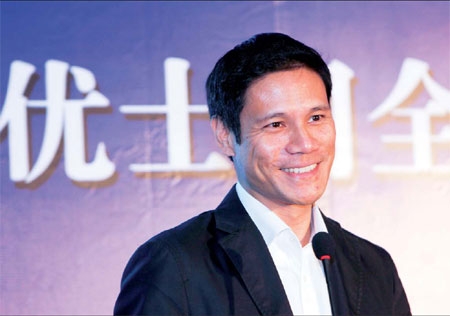Echoes of LinkedIn vie for China
Updated: 2012-04-06 14:25
By Li Aoxue and Chen Yingqun (China Daily European Edition)
|
|||||||||||
|
 Dominic Penaloza, co-founder of Ushi.com, sees attractive opportunities in the professional social network business. Provided to China Daily |
Professional social network sites get creative to attract Chinese users
LinkedIn, the business-related social network is just that - all business. Users mainly communicate through email in a relatively simple site.
But imagine if you could "poke" a possible employer, much as you do with friends in Facebook, or have the ability to create groups so that users can first know each other before doing business.
Welcome to the world of China's professional social networks, where the field is wide and the competition fierce and where there are a number of prominent sites vying for the attention of the second biggest economy in the world.
Tianji.com, one of China's earliest professional networks, is one of the more creative sites in the country. It is among the pioneers to adopt the poke feature and the ability to create user groups within its site.
It's also the subsidiary of one of LinkedIn's major rivals, Viadeo, which has 40 million users globally. The French company expanded to China with its acquisition of Tianji.com in 2009. At that time, Tianji had only 3 million users, but today has reached 8 million and adding 500,000 users a month, according to the company.
LinkedIn has roughly a million users in China and 135 million worldwide, but Tianji founder Derek Ling isn't batting an eye. He says professional social networks are ready to break out in China.
Professional networks were first established in China eight years ago as a platform for professionals to maintain and grow their network. By using professional networks, people could also be provided with job opportunities.
There are currently about 20 professional networking sites in China. In addition to Tianji, there are Wealink.com, Renhe.cn, Ushi.com, Jingwei.com and Aceona.com.
|
 |
"We feel that nobody is dominating the market in the same way that LinkedIn does in the Western market, so we view it as an attractive opportunity because nobody is strong in the market," says Dominic Penaloza, co-founder and CEO of Shanghai-based Ushi.com.
Penaloza and his co-founder Zhang Yue (who came from Tianji) have also added some creative twists to attract Chinese users and their different habits of communicating.
"LinkedIn is quite email-centric. It is built on email as the communicating tool. But the Chinese people use short messaging service more. It is very different," he says.
In Ushi, users can use a function called "hunting message". When HR managers or recruiting clients want to call a candidate found on Ushi, the hunting message will allow the candidate to share their phone numbers with employers quickly.
Penaloza says the major differences between LinkedIn and Ushi is localization in terms of its network as well as its products. Apart from using Chinese as the main language, Ushi launched a mobile phone version in March 2010. It is also the first Chinese professional network to have a mobile application on the Android platform and for the iPhone and iPad.
Penaloza says the first Ushi users were members of venture capital firms, investment banks, as well as law and accounting firms. It had 20,000 users in its first year but has grown to almost a million.
"Our members increase by 1,000 every day," Penaloza says. "We plan to reach more than two millions users by the end of December."
Half of Ushi users live in Shanghai and Beijing and 93 percent of the total number of users are university graduates. The average age is 31 years old.
Tianji, founded in 2005 by Ling, a former vice-president of Sina.com (China's largest Internet portal), currently has 9 million users.
"With the market of entertaining SNS (social networking service) booming in China, it is not that difficult for people to raise their awareness of using professional networks," Ling says.
He believes the site will have about 30 million users next year. Ling says one of the main purposes in establishing Tianji was to help graduates find jobs. The site earns most of its revenue from recruiting tools, but is free to regular users.
One of the main problems with professional networking sites in China, however, is the concept of guanxi, in which Chinese people network professionally offline in face-to-face meetings or interactions. Ling says in China, people want to know each other first, which is why he created the ability to create groups in Tianji, where users can "meet" and communicate with each other.
"This is different from the United States, as if two people have similar values, they would like to cooperate and do business together, but in China, you have to have made quite good acquaintance with your partner first," says Ling, who is a Chinese American and spent his childhood in Chengdu, Sichuan province.
Not only have more users begun to use professional networks, but enterprises in China are starting to pay attention to these sites.
In January, Nokia China posted 500 new positions on Tianji. Last year, Zoomlion International Trade Co Ltd, China's second biggest machinery manufacturer, posted opportunities for internships on Dajie.com, a Chinese professional network site established in 2008.
But China is not without its naysayers of professional social network sites. Wei Wuhui, a lecturer at Shanghai Jiao Tong University who worked in and researched China's Internet companies, doesn't see a profitable future for these sites.
"I don't think the future of professional network can be very optimistic," he says. "I don't even think it can evolve into a business model in a few years."
Wei says that the Western culture is based on relations between people who are not close, while the Chinese culture is based on relations among family members and close friends.
"In China, most Chinese people still find jobs with the help of family members or close friends," Wei says. "For the recruitment of junior-level talent, Chinese companies usually enter college campuses. For middle- or senior-level talents, they will ask friends for an introduction."
Wang Zhentao, a lecturer at the Beijing City University who finds internship opportunities for his students, disagrees. After seeing many of his students struggle to find internships, Wang tried Tianji in 2006 with a lot of success.
"Professional networks are like a bridge connecting professionals," Wang says.
Contact the writers at liaoxue@chinadaily.com.cn and chenyingqun@chinadaily.com.cn
Today's Top News
Rescuers race against time for quake victims
Telecom workers restore links
Coal mine blast kills 18 in Jilin
Intl scholarship puts China on the map
More bird flu patients discharged
Gold loses sheen, but still a safe bet
US 'turns blind eye to human rights'
Telecom workers restore links
Hot Topics
Lunar probe , China growth forecasts, Emission rules get tougher, China seen through 'colored lens', International board,
Editor's Picks

|

|

|

|

|

|





